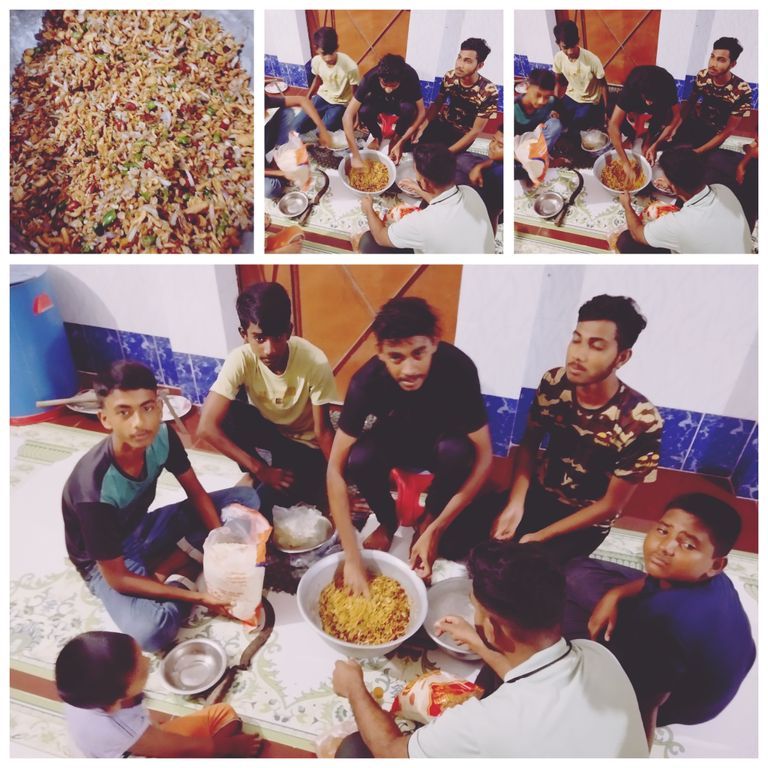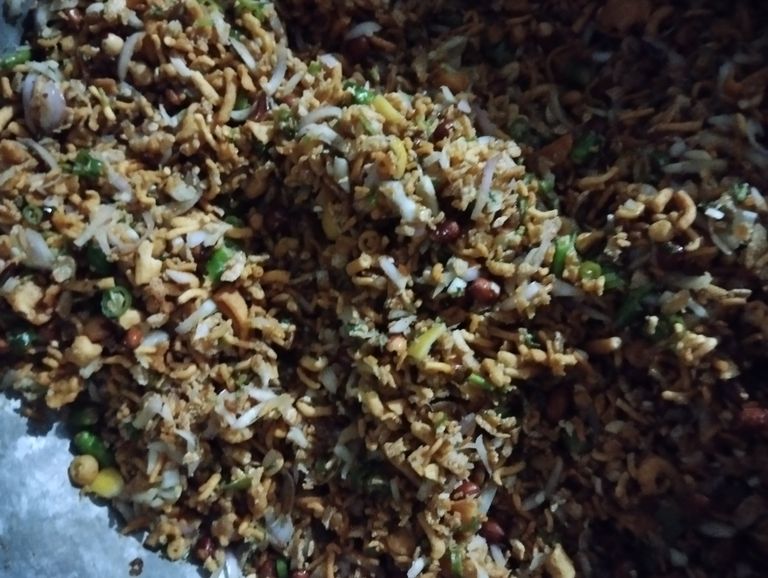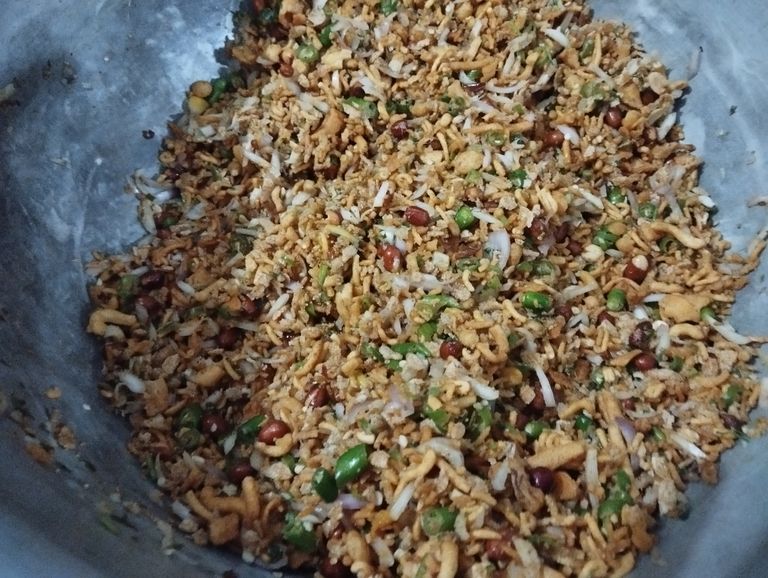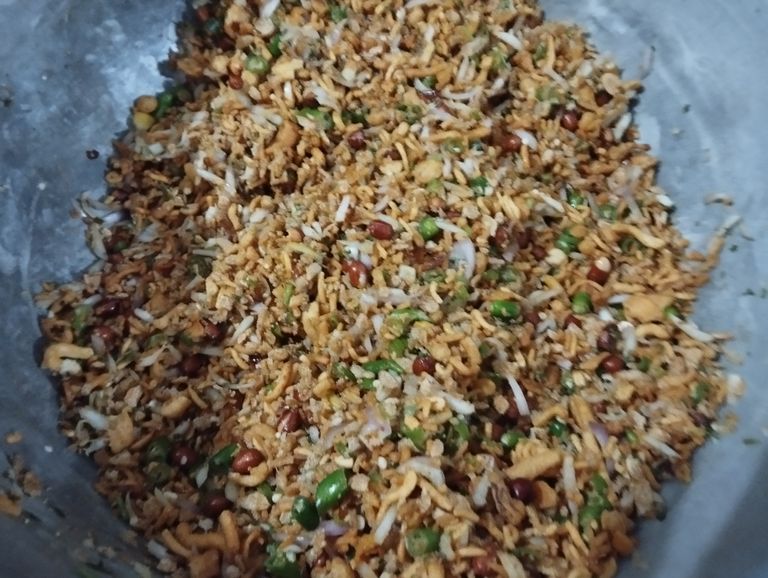The Joy of Eating Jhal Muri with Friends: A Celebration of Simple Pleasures.

In the busy world we live in today, it's often the simple pleasures that bring the greatest joy. One such experience is sitting down with friends and sharing a humble plate of Jhal Muri, a popular Bengali street snack that has a special place in the hearts of many. For anyone who has ever lived in or visited Bengal, the memories of enjoying this spicy, tangy mixture with friends, especially on a breezy evening or during a casual outing, are deeply cherished. This is not just a snack, but a social experience, a celebration of companionship and the small joys that bind us together.
What is Jhal Muri
For the uninitiated, Jhal Muri is a traditional Bengali street food made from puffed rice (muri), seasoned with mustard oil, green chilies, onions, tomatoes, peanuts, coriander leaves, and a mix of spices. The word Jhal means "spicy," and Muri refers to the puffed rice, the central ingredient of this dish. The combination of ingredients gives it a burst of flavor – the spiciness from the green chilies, the tang from the lemon, and the crunch from the puffed rice and peanuts make every bite a flavorful adventure.
However, what makes Jhal Muri truly special isn’t just the taste, but the experience of eating it in a group, surrounded by laughter, stories, and the warmth of friendship.
The Setting: Street Corners, Parks, and Shared Spaces
There’s something magical about the setting where Jhal Muri is typically enjoyed. It's not a snack you eat in fancy restaurants or high-end cafes. Instead, you find it being sold by vendors on the streets, outside schools, colleges, or in public parks. The vendor prepares it fresh in front of you, tossing the ingredients together in a rhythmic fashion, and serves it in small paper cones or bowls made from dried leaves.
The casual, unpretentious setting is key to the experience. Sitting on park benches, standing on street corners, or simply finding a comfortable spot on the steps of a monument, people gather with their friends, sharing a common love for this snack. The simplicity of the snack mirrors the simplicity of the surroundings – it's about being present in the moment, away from the formalities of life, and enjoying something humble yet deeply satisfying.
A Shared Joy: Bonding Over Jhal Muri

Food has always had a way of bringing people together, and Jhal Muri is no different. There’s something about the informality of the snack that breaks down barriers. It’s not a dish you eat politely with a fork and knife; you dig in with your hands, sharing from the same bowl, passing it around, laughing as someone wipes away a tear from the heat of the chilies, or comments on the perfect balance of flavors. It’s food that encourages conversation, and that’s the essence of what makes eating Jhal Muri with friends so joyful.
In many ways, sharing Jhal Muri is like sharing stories. As the puffed rice crunches in your mouth, you share bits and pieces of your life with those around you – whether it’s recounting a funny incident from childhood, discussing the latest movie, or simply talking about your day. The casual nature of the snack lends itself to casual, open conversations, creating an atmosphere of camaraderie and connection.
Nostalgia in Every Bite
For many, the joy of eating Jhal Muri with friends is tied to nostalgia. It’s a snack that’s often associated with childhood or college days, times when life was simpler and free from the responsibilities of adulthood. Memories of school trips, college festivals, or spontaneous evening hangouts often come rushing back with each bite.
In those moments, eating Jhal Muri was not just about satisfying hunger – it was about bonding with friends, making memories, and cherishing the shared experience. Even years later, when people are far away from home or busy with their lives, the thought of sitting down with a bowl of Jhal Muri with friends can bring a wave of warmth and nostalgia.
A Snack for All Seasons
Another unique aspect of Jhal Muri is that it’s a snack that can be enjoyed in any season. During the cool winters, the warmth of the spices offers a comforting feeling, while in the hot summers, the tanginess and crunch provide a refreshing break. It’s light enough to be a quick snack but flavorful enough to leave a lasting impression.
For those living in bustling cities, grabbing a plate of Jhal Muri and heading to the nearest park or riverbank with friends can be the perfect escape. It’s a way to take a break from the hectic pace of life, to slow down, and to reconnect with people who matter. Even during rainy monsoons, when the skies are overcast, there's an undeniable charm in gathering under a shelter with friends, munching on Jhal Muri, and watching the rain fall.
The Vendor’s Role in the Experience
Another integral part of the Jhal Muri experience is the vendor who makes it. Often, these vendors have been in the business for years, perfecting their own unique version of the snack. Many of them become familiar faces in the community, serving generations of customers. The way they mix the ingredients with a swift, practiced hand is almost an art form in itself. They know exactly how much spice to add, how to balance the flavors, and often have their own secret ingredients that set their Jhal Muri apart.
For regulars, there’s a certain comfort in returning to the same vendor, knowing that they’ll get the exact flavor they love. The friendly banter with the vendor, the casual exchange of pleasantries, and sometimes even bargaining over the price all add to the charm of the experience.
Beyond the Snack: A Symbol of Simplicity and Friendship
At its core, the joy of eating Jhal Muri with friends goes beyond the snack itself. It’s a symbol of the simple pleasures in life, a reminder that happiness often comes from the smallest of things. In a world where everything is increasingly fast-paced and complex, there’s something incredibly grounding about sitting down with friends and enjoying something as basic yet delicious as Jhal Muri.
It’s a snack that doesn’t demand much – just a few ingredients, a sprinkle of spices, and a group of good friends to share it with. But in return, it offers so much – laughter, connection, nostalgia, and a sense of belonging. It’s a celebration of the everyday moments that we often overlook, the kind that make life truly special.
Conclusion: The Timelessness of Jhal Muri Moments
In the end, the joy of eating Jhal Muri with friends is a timeless experience, one that transcends age, place, or time. Whether you’re a school student grabbing a quick bite after class, a group of college friends sitting by the lake, or adults reminiscing about old times, Jhal Muri has a way of bringing people together, creating memories that last a lifetime.
So, the next time you find yourself with a group of friends and a plate of Jhal Muri, take a moment to savor not just the flavors, but the company, the laughter, and the shared experience. Because in the end, that’s what makes it truly special.



The Health Risks of Eating Jhal Muri: What You Should Know
Jhal Muri, a popular street food in Bengal and other parts of India, is an iconic snack that is beloved for its spicy, tangy flavor. Made with puffed rice (muri), peanuts, spices, mustard oil, and a mix of vegetables like onions, green chilies, and coriander, it has become a staple quick bite for many. The simplicity of the dish, combined with its rich flavor profile, makes it a go-to snack for people on the move. However, despite its widespread popularity, Jhal Muri has certain downsides, especially when it comes to health. In this blog, we will explore the potential risks associated with regular consumption of Jhal Muri and why it should be consumed in moderation.
1. High Sodium Content: A Risk for Blood Pressure
One of the main ingredients in Jhal Muri is a variety of spices and seasonings, including salt. Excessive sodium intake is associated with an increased risk of high blood pressure (hypertension), which can lead to serious cardiovascular issues like stroke and heart disease. Many street vendors add extra salt, chutneys, or sauces to enhance the flavor, significantly boosting the sodium content. Over time, consuming high amounts of sodium can have detrimental effects on your heart health, especially if you already have a predisposition to hypertension.
2. The Use of Unhealthy Oils: A Concern for Heart Health
Mustard oil, a staple in Jhal Muri, has been debated for years regarding its health benefits and risks. While mustard oil is high in monounsaturated fats, which are considered healthier than saturated fats, it also contains erucic acid. In high concentrations, erucic acid may be linked to heart problems, such as myocardial lipidosis, a condition where fat deposits form in heart tissues. Additionally, street vendors may substitute mustard oil with cheaper, less healthy alternatives like refined oils, which are highly processed and contain trans fats. These trans fats are known to increase bad cholesterol (LDL) and decrease good cholesterol (HDL), leading to an increased risk of heart diseases.
3. Contamination and Hygiene Issues
Street food, including Jhal Muri, is often prepared in less-than-ideal hygienic conditions. Vendors on busy streets may not always have access to clean water or facilities to properly wash the ingredients. The puffed rice, vegetables, and other components are often left exposed to open air, dust, and pollution, making them susceptible to contamination. Bacterial contamination, such as E. coli or Salmonella, can lead to foodborne illnesses, which can cause vomiting, diarrhea, and even more severe health problems, especially for people with compromised immune systems.
Moreover, the preparation surfaces and utensils might not always be cleaned properly, leading to cross-contamination from other food items or dirty hands. Even mustard oil, when reused multiple times (which is common among street vendors), can break down into harmful compounds that are linked to an increased risk of cancer and other chronic diseases.
4. High Caloric Content
Though Jhal Muri seems light, it is deceptively high in calories. The use of peanuts, mustard oil, fried snacks like sev, and spicy mixtures all contribute to the overall calorie count. For people looking to manage their weight, regularly consuming Jhal Muri can be counterproductive. While occasional indulgence may not be an issue, frequent consumption can lead to weight gain, especially when combined with a sedentary lifestyle.
The inclusion of fried ingredients, like fried lentils or fried chickpeas, adds to the calorie content, making it a calorie-dense snack. Moreover, the portion sizes are often quite large when bought from street vendors, making it easy to consume more calories than intended.
5. Spice Levels and Digestive Problems

Jhal Muri is well-known for its spicy flavor, thanks to the liberal use of green chilies, black pepper, and various spice powders. While some people may enjoy the heat, excessive spice can irritate the stomach lining, leading to digestive problems like acid reflux, gastritis, and even ulcers in the long term. People who are sensitive to spicy food may experience bloating, gas, and discomfort after consuming Jhal Muri.
Mustard oil, a strong-tasting oil, can also be an irritant to some individuals, causing gastric discomfort and other digestive issues, particularly when consumed in large amounts.
6. Nutritional Imbalance
While Jhal Muri may seem like a healthy snack because of the inclusion of vegetables like onions, tomatoes, and coriander, the overall nutritional content is not well-balanced. Puffed rice, the main component, is low in fiber and protein, making it less filling compared to whole grains or other more balanced snacks. This lack of fiber can lead to overeating, as you may not feel full or satisfied after consuming a portion of Jhal Muri.
Moreover, the snack is relatively low in vitamins and minerals, with most of its calories coming from carbohydrates and fats. For individuals looking for a nutritious and balanced snack, Jhal Muri falls short in providing essential nutrients like protein, vitamins, and minerals, which are necessary for overall health.
7. Addictive Nature and Overconsumption
The combination of spicy, tangy, and savory flavors in Jhal Muri makes it an addictive snack for many. The taste profile is designed to hit multiple flavor notes, making it hard to resist. However, this can lead to overconsumption, especially if you’re frequently snacking throughout the day. Over time, this can result in weight gain, digestive problems, and an unhealthy reliance on high-calorie, low-nutrient foods. The snack’s low fiber and protein content mean that it doesn’t provide long-lasting satiety, leading to more frequent snacking.
8. Allergic Reactions
Jhal Muri often includes ingredients like peanuts, lentils, and chickpeas, which are common allergens. People with nut or legume allergies should be cautious when consuming Jhal Muri, as it can trigger allergic reactions that range from mild itching or swelling to severe anaphylaxis, which can be life-threatening.
Conclusion
While Jhal Muri is undoubtedly a delicious and nostalgic snack for many, it’s essential to be mindful of its potential health risks. Its high sodium and oil content, combined with hygiene concerns and the use of fried ingredients, make it a less-than-ideal snack for regular consumption. The risk of overconsumption, coupled with digestive issues and possible allergen exposure, means that it’s best enjoyed in moderation.
If you're a fan of Jhal Muri but want to make healthier choices, consider preparing it at home using fresh, clean ingredients and reducing the amount of oil, salt, and fried components. By doing so, you can enjoy this beloved snack without compromising your health.




The Benefits of Eating Onions: A Comprehensive Guide
Onions, a staple ingredient in many cuisines around the world, have been valued for their unique flavor, aroma, and health benefits for thousands of years. From ancient times, onions were used not only as a food source but also as a remedy for various ailments. Today, modern research backs up many of these health claims, revealing that onions are packed with essential nutrients and compounds that promote overall well-being. This article delves into the myriad benefits of consuming onions and why they deserve a regular place in your diet.
1. Rich Source of Antioxidants
Onions are a powerhouse of antioxidants, which are compounds that help to neutralize free radicals in the body. Free radicals are unstable molecules that can cause damage to cells, potentially leading to chronic diseases such as cancer, heart disease, and diabetes. The antioxidant content of onions comes from their rich flavonoid and polyphenol content, with quercetin being the most prominent. Quercetin has been found to have anti-inflammatory, antiviral, and anticancer properties.
2. Boosts Immune System
Onions contain a high amount of vitamin C, a crucial nutrient for a healthy immune system. Vitamin C is known to boost the production of white blood cells, which are the body's main defense against infections. Regular consumption of onions can, therefore, help protect against common illnesses like colds and flu. Additionally, the sulfur compounds in onions have antimicrobial properties, which may help to prevent bacterial infections.
3. Improves Heart Health
The flavonoids and sulfur compounds found in onions are beneficial for heart health. These compounds help to reduce cholesterol levels, lower blood pressure, and improve the elasticity of blood vessels, all of which contribute to better cardiovascular health. Several studies suggest that onions can help to reduce the risk of heart disease by lowering LDL (bad) cholesterol and increasing HDL (good) cholesterol levels.
4. Anti-Inflammatory Properties
Chronic inflammation in the body can lead to various health problems, including arthritis, cardiovascular disease, and even cancer. Onions contain compounds such as quercetin and sulfur that have been shown to reduce inflammation in the body. Regular consumption of onions can help to alleviate symptoms of inflammatory conditions, such as rheumatoid arthritis and asthma.
5. Supports Digestive Health
Onions are a great source of dietary fiber, which is essential for maintaining a healthy digestive system. Fiber helps to regulate bowel movements, prevent constipation, and reduce the risk of developing digestive disorders such as irritable bowel syndrome (IBS). Additionally, onions contain a type of soluble fiber known as fructans, which act as prebiotics. Prebiotics feed the beneficial bacteria in the gut, promoting a healthy balance of gut flora and improving overall digestive health.
6. May Aid in Blood Sugar Control
For individuals with diabetes or those at risk of developing diabetes, onions can be a valuable addition to their diet. Certain compounds found in onions, such as sulfur and quercetin, have been shown to help regulate blood sugar levels by improving insulin sensitivity. This means that onions may help to prevent spikes in blood sugar and could play a role in managing diabetes.
7. Bone Health
Onions are rich in several essential nutrients that contribute to bone health, including calcium, magnesium, and potassium. These minerals are important for maintaining bone density and preventing conditions like osteoporosis. Additionally, studies suggest that onions can help to increase bone mineral density, particularly in women going through menopause, a time when bone loss is accelerated due to hormonal changes.
8. Skin and Hair Health
The high vitamin C content in onions plays a crucial role in maintaining the health of the skin and hair. Vitamin C is necessary for the production of collagen, a protein that provides structure to the skin and hair. Adequate collagen production can help to reduce the appearance of wrinkles and improve skin elasticity. Additionally, the antimicrobial properties of onions can help to treat scalp infections and promote healthier hair growth.
9. Detoxification Properties
Onions are known for their detoxifying effects. They contain sulfur compounds that help the liver in detoxifying the body by removing toxins and waste products. Sulfur also helps in the production of glutathione, an antioxidant that plays a vital role in neutralizing toxins in the body. By supporting the liver, onions contribute to a more efficient detoxification process.
10. Cancer-Fighting Properties
Several studies have suggested that the regular consumption of onions may reduce the risk of certain types of cancer, including stomach, colorectal, and breast cancer. The sulfur compounds in onions, particularly allyl sulfides, have been shown to inhibit the growth of cancer cells and reduce the formation of tumors. Quercetin, another compound found in onions, has also been linked to cancer prevention due to its ability to fight free radicals and prevent oxidative stress, which can lead to cancer development.
11. Helps with Respiratory Conditions
Onions have traditionally been used as a remedy for respiratory conditions such as asthma, bronchitis, and allergies. The anti-inflammatory and antimicrobial properties of onions may help to clear the airways and reduce symptoms of respiratory issues. Additionally, the high sulfur content in onions may help to thin mucus, making it easier to expel from the respiratory system.
12. Weight Management
Onions are low in calories but high in fiber, making them a great addition to a weight loss or weight management diet. The fiber in onions helps to promote a feeling of fullness, which can reduce overall calorie intake and prevent overeating. Additionally, the antioxidants and anti-inflammatory compounds in onions can support metabolic health, further aiding in weight management.
13. Improves Eye Health
Onions contain small amounts of vitamin A, which is essential for maintaining good vision. Vitamin A is a component of the protein rhodopsin, which allows the eyes to see in low light conditions. While onions are not a major source of vitamin A, their antioxidant content can help to protect the eyes from oxidative damage, reducing the risk of age-related conditions such as cataracts and macular degeneration.
Conclusion
Incorporating onions into your diet can have a wide range of health benefits, from boosting your immune system to promoting heart and digestive health. Whether you eat them raw, sautéed, roasted, or in soups and stews, onions provide a wealth of nutrients and bioactive compounds that can improve your overall well-being. Rich in antioxidants, anti-inflammatory agents, and essential vitamins and minerals, onions truly deserve their place as a superfood in your kitchen. Make sure to include this humble vegetable in your daily meals and enjoy the numerous health benefits it offers.
Telegram and Whatsapp